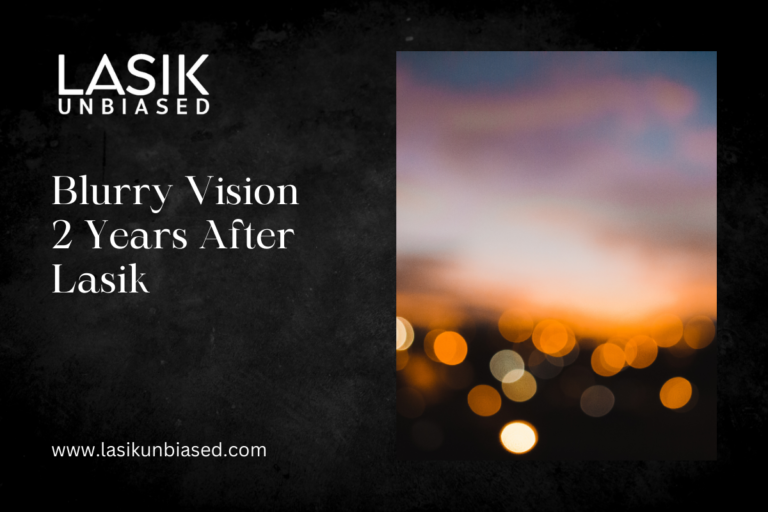LASIK (Laser-Assisted in Situ Keratomileusis) surgery is a popular and effective procedure that corrects refractive vision problems such as nearsightedness, farsightedness, and astigmatism. For most patients, LASIK results in long-term vision improvement, with many individuals experiencing near-perfect eyesight within a few days or weeks after surgery. However, some individuals may experience blurry vision months or even years after LASIK. If you struggle with blurry vision two years after LASIK, it’s essential to understand the possible causes and how to address them.
Possible Causes of Blurry Vision After LASIK
Regression of Vision
One potential cause of blurry vision years after LASIK is regression, in which the eyes gradually return to their pre-surgery refractive state. While LASIK provides long-lasting results for many patients, some individuals may experience a slight regression in their vision. This means that the corrections made by the laser during surgery may weaken over time, causing the return of nearsightedness, farsightedness, or astigmatism. Regression can occur due to various factors, including the natural healing process, changes in the corneal shape, or the development of age-related vision changes.
Presbyopia
Another factor to consider is presbyopia, which typically becomes noticeable in individuals over 40. Presbyopia is an age-related condition that gradually causes the loss of the eye’s ability to focus on close-up objects. Although LASIK can correct nearsightedness or farsightedness, it does not prevent presbyopia, leading to blurry vision for tasks such as reading or using a smartphone. In cases where a person has achieved excellent distance vision after LASIK, they may begin to notice blurry vision when focusing on close-up objects as they age.
Dry Eyes
Dry eyes are a common issue that can lead to blurry vision after LASIK. While dry eyes are a typical side effect in the immediate aftermath of surgery, some individuals may continue to experience dryness long after their LASIK procedure. Dry eyes occur when the eye does not produce enough moisture or the right kind of moisture to keep the eye’s surface lubricated. This can lead to intermittent blurry vision, irritation, and discomfort. Dry eye symptoms can worsen years after LASIK, especially in certain environmental conditions or due to hormonal changes.
Corneal Ectasia
In some cases, corneal ectasia may contribute to blurry vision. Although rare, corneal ectasia is when the cornea becomes weakened and bulges outward, distorting vision. This can occur after LASIK if too much corneal tissue was removed during the procedure or if the cornea was already thinner or more vulnerable. Corneal ectasia may lead to blurry vision and may require additional treatments to correct it.
Cataracts
Cataracts can also be a factor that contributes to blurry vision years after LASIK surgery. Cataracts are a natural part of the ageing process, and they involve the clouding of the eye’s lens, which can lead to blurry or dim vision. Cataracts are more common in older adults and can develop slowly over time. Even though LASIK corrects the shape of the cornea, it does not address issues related to the eye’s lens. If a cataract develops, it can cause vision problems that may be mistaken for blurry vision associated with LASIK.
General Health Changes
Changes in general health can also contribute to blurry vision after LASIK. Conditions such as diabetes can affect the eyes’ ability to focus and may lead to blurry vision. Blood sugar fluctuations in individuals with diabetes can cause the eye’s lens to swell or change shape, leading to vision distortion. If you have any underlying health issues or have developed a condition that affects your vision, it is essential to discuss these changes with your eye doctor.
What to Do if You Experience Blurry Vision After LASIK
If you are experiencing blurry vision two years after LASIK, scheduling a comprehensive eye exam with your LASIK surgeon or an ophthalmologist is crucial. The doctor will assess the health of your eyes, evaluate the state of your corneal flap, and check for any changes in your vision. Depending on the cause of the blurry vision, your doctor may suggest corrective measures, such as an enhancement procedure to correct regression, new glasses or contact lenses for presbyopia, or treatments for dry eyes. If cataracts or corneal ectasia are identified, further intervention may be necessary.
Blurry vision two years after LASIK is relatively uncommon but not unheard of. Various factors, such as regression, presbyopia, dry eyes, corneal ectasia, cataracts, or general health changes, can contribute to vision changes long after surgery. If you experience blurry vision or any other changes in your eyesight, it’s essential to consult with an eye care professional to determine the underlying cause and receive appropriate treatment. You can address the issue with proper guidance and enjoy the benefits of a clearer vision.


